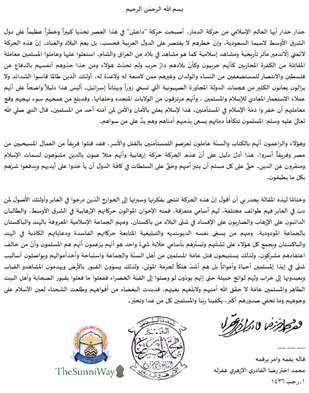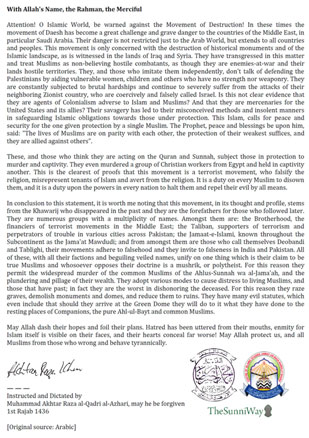
By Ghulam Ghaus Siddiqi, New Age Islam
30 July 2018
I was invited, on July 26, 2018, as a
speaker to participate in a condolence program held by Jamia Hazrat Nizamuddin
Aulia, a Sufi-Sunni affiliated Islamic seminary located at Zakir Nagar New
Delhi, on the sudden demise of Qazi al-Quzat (the greatest Qazi) of
India, Mufti Akhtar Raza Khan Azhari popularly known as Tajush Sharia and
Azhari Miyan. A number of Islamic clerics, scholars, graduates of Jamia
al-Azhar, Madrasa students and local residents, mostly with hidden tears in
their eyes, attended the program.
The condolence program was conducted under
chairmanship of Maulana Mahmood Azhari, the grandson of Allama Arshad ul Qadri
and director of Jamia Hazrat Nizamuddin Aulia (JHNA). The program, headed by
Maulana Syed Atique Azhari, the principal of JHNA, began with recitation of the
Quran in voice of Hafiz Rehan Raza, the student of JHNA. Then Syed Minhajuddin,
Maulana Ali Imam and Mahboob Zafar Nizami sang Manqabat (a Sufi-devotional
poem) in loving memory of Allama Tajush Sharia.
In his address Maulana Imran Ahmed Azhari,
an Imam of Raza Masjid (Zakir Nagar) and teacher of JHNA, highlighted some
significant aspects of Tajush Sharia. He said Tajush Sharia practically
followed in the footsteps of the beloved Prophet and became a true lover of the
Prophet Muhammad (peace be upon him). He said Islamic scholars and Muftis from
across the world often gathered to learn from Tajush Sharia lessons of in-depth
understanding of Tafsir, Hadith, Fiqh (Islamic Jurisprudence), Shariat and
Tariqat. His memory, Maulana Imran Azhari said, was so strong that whenever any
scholar or student mistakenly read out any Arabic passage of Tafsir or
Hadith-books, he immediately pointed out to the mistake.
In his speech, Maulana Faizan Ahmad Naeemi,
an Imam of Qadri Masjid Zakir Nagar, said Tajush Sharia was so influential that
35 to 40 million Muslims all across the world had become his Murids (seekers of
spiritual path or persons committed to a Murshid i.e. spiritual guide).
In his funeral prayer, he said, an overwhelming crowd of about six to seven
million Muslims participated and prayed for his Maghfirah (forgiveness)
and higher rank; which indeed bears witness to his spiritual acceptance and
popularity.
Expressing his condolences over the death
of Tajush Sharia, Maulana Syed Atique Azhari said, Tajush Sharia has gone to
glory leaving us in this world but our feelings and emotions are not ready to
accept this truth.
In my address, I (Ghulam Ghaus Siddiqi)
also enumerated some striking features of Tajush Sharia, the features that made
him acceptable to millions of Muslims across the world. It was an emotional
moment to express condolences for and recount virtues of Tajush Sharia, as he
was my spiritual guide (Murshid) and teacher. I would like to present some
aspects of Tajush Sharia here for the readers of newageislam.com in more
details than what I referred to in my speech at JHNA.
Tajush Sharia born in Bareilly was a true
heir of Sunni Islamic sciences represented by Ala Hazrat Imam Ahmad Raza. He
was successor of Mustafa Raza Khan known as Mufti-e-Azam of India. It was his Taqwa,
devotion and commitment to true teachings of Islam based on Shariat, Tariqat
and Marfat that made him beloved to millions of Muslims across the globe. Even
those belonging to other schools of thought (such as Deobandis and Shias) bear
witness to his mastery over Islamic Sciences, his spiritual and practical
commitment to Islam. For that matter, he did not have to walk on the path of
violence and extremism. What he did was that he practiced Islam the way the
great Sunni-Sufis of the past did.
In order to perform responsibility of
Sharia, It is essential for a good Mufti to be aware of the circumstances and
current affairs of the world. In 1995 when Election Commission of India had
made it necessary to have a photo identity card for all the Indian citizens, a
large number of Muslim clerics and scholars from the country sought fatwa from
Tajush Sharia, as taking photography of living things was then considered
absolutely and non-conditionally forbidden (Haram). When Allama Arshad ul Qadri
and other Islamic scholars held a meeting at Jamia Ashrafia Mubarakpur
Azamgarh, and sought fatwa from him, Tajush Sharia conditionally allowed taking
photo only for fulfillment of the required purpose such as identity card,
passport and license etc. But he did not justify taking unnecessary photos
other than the requirements. He took this step under the fiqhi maxim of
“excessive necessities cause the prohibited things to be permissible”, (الضرورات تبيح
المحظورات).
Tajush Sharia kept himself away from
politics. Maulana Shahabuddin writes that once Indian Prime Minister P. V.
Narasimha Rao was inspired by Tajush Sharia and therefore wanted to meet him.
Tajush Sharia said “I am a religious man. I am always busy performing the tasks
assigned to me by my pious saints. I am not a political man. Muslims are angry
with him (P.V. Narasimha) for the demolition of Babri Masjid. For such reasons,
I do not want to meet him. However, if he wants to visit Dargah-e-Ala Hazrat,
he can come and visit it”. Maulana Shahabuddin says Tajush Sharia did not meet
him while the PM P. V. Narasimha Rao kept waiting for about 8 hours in the
circuit house of Bareilly. (Shahabuddin Razvi, Biography of Tajush Sharia)
On May 05 1985, Tajush Sharia along with
Allama Arshad ul Qadri participated in international Hijaz Conference in order
to address the rising problems of Muslim world. He presided over the conference
and made a remarkable speech on his subject. Besides he participated in several
international programs to solve issues of Muslim community.
For his religious and intellectual
services, Tajush Sharia was given a special award of Jamia al-Azhar called
“Pride of Performance”. This award is specifically given to the most
influential Islamic personality. Not only the non-Arab scholars of Islam but
also the great scholars of Arab world did appreciate his mastery of Islamic
sciences, his piousness and Taqwa.
It is reported that Shaikh al-Azhar Allama
Syed Tantawi and Tajush Sharia had different views on two religious issues but
when they discussed together, Shaikh al-Azhar had to finally support Tajush
Sharia’s views. For example, Shaikh al-Azhar regarded the hadith “My Companions
are like the stars, whichever of them you follow you will be rightly guided” as
fabricated (Mauzu) but after discussion Shaikh al-Azhar supported Tajush
Sharia’s view, that is, “This Hadith is acceptable with the principle of Talaqqa
bil Qubul and hence not fabricated”. Shaikh al-Azhar Allama Tantawi also
accepted another research of Tajush Sharia that the father of Hazrat Ibrahim
was Tarih and not Aazar who was actually parental uncle of Hazrat
Ibrahim (peace be upon him) under the lengthy clarification of Arabic word “ab”
mentioned in the Quranic verse (6:74)
Due to his excessive travel and a large
number of programs all across the world, Tajush Sharia had very little time for
writing. His Fatawa (religious decrees) are put aside for his attention
and they are mostly answered while he is on a journey. However he has written,
compiled, edited and translated dozens of Islamic books. Some of the famous
ones are:
1)
Al Haqqul Mubeen 2 volumes,
2)
Difa-e-Kanzul Iman,
3) Miratun Najdia Bi Jawaabil Bareilwiyah
4) Tasweero Ka Shari Hukm
5)
Sharah Hadith-e-Niyah,
6)
Hadrat Ibrahim Ke Waalid Tariq Ya Aazar
7)
Taqdimu Tajjali Aslam
8) Hashia Sharah Qasidah Burdah
9)
Kya Deen Ki Mahm Poori Ho Chuki
10) Jashne Eid-e-Meelad -Un-Nabi,
11)
Taaleeqat al-Azhari ala Saheeh al-Bukhari
12) Translation of al-amn wal ula li
naa-e-til Mustafa bi dafeil Bala
13)
Commentary on Qawareul Qahhar Fi Raddil Mujassamatil Fujjar
14)
Saddul Mashare,
15)
Al-Sahaba nujum al-Ihtida etc.
Two
volumes of his Fatawa titled “Fatawa Tajush Sharia” have been published.
Three years ago, in its report dated Dec 09
2015, the leading newspaper, Times of India said “70,000 clerics issued fatwa
against terrorism, 15 Lakh Muslims support it”. This fatwa was actually
inspired by Tajush Sharia Mufti Akhtar Raza Khan.
During the condolence program, I briefly
referred to Tajush Sharia’s fatwa against terrorism. But here for readers of
newageislam.com, I would like to present full copies of Tajush Sharia’s fatwa
issued against terrorist organizations such as “ISIS” also known as “Daesh” in
Arabic with its translation in English.

Arabic copy of Tajush Sharia’s Fatwa
Issued on April 20, 2015 against Terrorist organizations like ISIS aka Daesh

English Translation of Tajush Sharia’s Fatwa Issued April 20, 2015
against Terrorist organizations like ISIS aka Daesh
(Courtesy The Sunni Way)
The
more we go in details, the more virtues
of Tajush Sharia we find. It would be no exaggeration to say that Tajush
Sharia
was a true embodiment of Shariat and Tariqat in this age. His death is
an irreparable loss to the Muslims’ spiritual and scholarly world,
especially in
India. May Allah Almighty grant him special proximity and bounty and
give
patience to his family, relatives and followers across the world!
Ghulam Ghaus Siddiqi Dehlvi is a Classical scholar of Islamic Sciences
(Theology, Fiqh, Tafsir and Hadith), English-Arabic-Urdu Writer and Translator.
So far he has written more than a hundred articles, especially on subjects like
de-radicalization, counter-terrorism, Peaceful coexistence, Islamic Mysticism
(Tasawwuf).




 Moderate Islamist here
Moderate Islamist here


0 comments:
Post a Comment